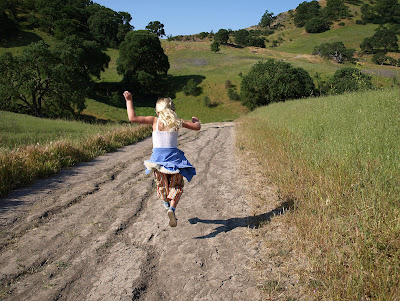
Sobeit has up a great post today about the need to consult our landbase when we make important decisions.
In all [E]arth traditions there is an understanding that the land is a witness to truth, that its very molecules do not lie, that its constituent fabric and all life forms that naturally grow upon it are wise in ways that humans rarely match.
. . .
One thing is certain: whoever lives upon a land with respect is welcomed by that land in ways deeper than we can imagine - a fact we should bear in mind when issues of race and culture are raised. For those who are true to the land shall find that the land also keeps faith with them. With our ability to move about the earth and settle at will, we do well to first consult the region where we are thinking of living, going straight to the land and speaking with its spirit, so that we can live with discrimination, truth, and respect.
"Wherever you are living, go and stand on bare, unconcreted earth and commune with the spirit of the land. Return to your home and in soul-flight go back to the site you visited and ask for a better sense of discrimination."
[From: The Celtic Spirit by Caitlin Matthews]
Earlier this week, a friend and I were discussing a point that Thorn Coyle makes in Kissing the Limitless:
The [E]arth remembers us, and the places where we grew up or have lived a long time recognize our patterns, just as we recognize the patterns of those places. Upon entering a new place, I always strive to introduce myself to the energies there. If there is time, I spend long moments in meditation, sending out tendrils of my life force into the land and sky, getting a better feel for the space and the beings that reside there, and noticing what is different from my home. This introduction also gives me a sort of permission to be there, and my time there is more joyously spent.
Starhawk is talking seriously about making a movie from one of the three or four books that completely changed my life, The Fifth Sacred Thing. (It's one of those projects that makes me think, "If it could be done well, it would be wonderful. But I'm so afraid that, once the process starts, best intentions and good plans notwithstanding . . . ." And I'd rather see it not done than see it done with compromise.) One of the things I love best in that book (well, I love a lot, but, lawyer that I am, one of the things that I love "really, really best," as G/Son says,) is the description of how decision-making happens. There are people from the various affinity groups gathered together in a room, each speaking from hir heart about how best to proceed against a threatened invasion. Some argue for war, some argue for sabotage, some argue for nonviolent resistance. And, then:
The Speaker raised her hand, calling for silence, and bent her ear to the Salmon mask.
"Friend Salmon says, 'Learn from water. Water is malleable, water is gentle, but drops of water wear away stone, and everything it touches is shaped by its passing.'" She sat down again. [And then the argument goes on, some calling each other cowards, some explaining what's wrong with that notion, . . . .]
When I first read that passage, all that I could think of was the question that my Environmental Law professor asked the class: "What's wrong with Justice Douglas' proposition that someone should be appointed to 'speak for the trees?'" Older, and maybe sadder than a lot of the class, my hand went up. "Weyerhauser will create a "Committee to Speak for America's Trees" and explain why trees long for, need, in fact, must have, clear cutting." I got an A.
I've been mulling over, lately, the notion of how we can have a democratic (forget consensual, let's just talk about honestly democratic) society when the money of large corporations appears capable of contaminating everyone and everything. I'm not a member of the "Democratic wing of the Democratic Party." I'm so far to the left of that, that it's difficult to even see that over the horizon. But I'd be orgasmically ecstatic to see that wing of that party these days. Because I don't. Other than Elizabeth Warren, I see, from the White House on down, a whole lot of people who, while I have no doubt that they went into politics planning to do good, are the sort of persons of whom Winston Churchill is once supposed to have remarked, "We've already established that. All that we're arguing about now is the price." And I wonder, more and more, how can we ensure that there's anyone who has (1) a real seat at the table, (2) in the Salmon mask, who (3) isn't colonized by those who make money killing Salmon and destroying Salmon's habitat?
And the only glimmer of an answer that I've been able to discern is encapsulated in Sobeit's post. We have to, as a cultural value to which we all give real credence, return to, taste, and listen to the Land, our Watershed. And while I think (and I am a woman who has given her life to The Law and would do so again, tomorrow, with a happy heart) that The Law can help to make a difference, what really has to happen is for us to begin to tell ourselves better stories. As Muriel Rukeyser said, “The universe is made of stories, not of atoms.” The universe that we perceive is, indeed, made of the stories that we tell ourselves and our children.
And we have to start telling a different story. Not only in our legal opinions, but elsewhere, as well, in those stories that seep into our bones before we ever read a law or a news story about a Supreme Court opinion.
This weekend, I read G/Son the story of Merlin and King Arthur. And it gripped him and raised questions within him as it has (repository of so many Western archetypes that it is) in generations and generations of post-Roman Celts. In the version we read, Arthur goes to France to besiege Lancelot for daring to sleep with (the Queen of) Arthur's Land, Albion. And it is while Arthur has turned his back on his land in order to pursue the demands of Patriarchy that Mordred raises an army against Arthur, requiring Arthur to abandon his fight with Lancelot and return to Arthur's own land to slay Arthur's Son (destroying what Patriarchy pretends to be about -- male progeny -- for what it's really about -- death), lose Arthur's relationship with Arthur's land, and sail off to a land ruled by three women in order to be able to return again in the hour of England's greatest need. Although the book clearly said that "Some said that Mordred was the King's own son," that was too much for G/Son to process. So on each successive reading of the story, when we got to the part where Arthur and Mordred slay each other, G/Son said to me, "Nonna, why the King fought with his own brother?" And each time I would say, "Arthur fought with his closest male relative because he didn't know what else to do. He had boxed himself into a corner by imagining that he could own and control either a woman or The Land. Arthur was a good man who wanted to help people, but he made a big mistake. He couldn't see that women, like Guinevere, and that a landbase, like England, must be free to make their own choices. Mordred made the same mistake."
The stories that we tell, the stories that we hear as children from our Nonnas, the stories that we see on tv, the stories that they show at the movie theatres: those stories matter. They matter in as basic and as important a manner as whether or not we can find a way to do what Sobeit, Thorn Coyle, Starhawk, and Justice Douglas have all urged us to do: to listen to our Landbase, to pay attention to our Watershed.
Because, after all, we desperately need a Lorax, who speaks for the trees:
Yes, I am the Lorax who speaks for the trees, which you seem to be chopping as fast as you please. But I'm also in charge of the brown Bar-ba-loots, who played in the shade in their Bar-ba-loot suits and happily lived eating truffula fruits. Now, thanks to your hacking my trees to the ground, there's not enough truffula fruit to go 'round!
Picture found here.












